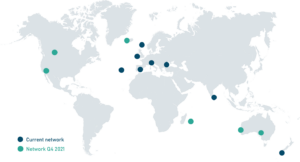Adding sites in Sri Lanka, the Azores and Scotland increases Leaf Space’s total ground station count to 12, which will support 14 satellites from six customers due to launch on SpaceX’s Transporter-2 ride-share mission. SpaceX recently said it plans to announce a new date for this launch, which had been slated for June 25, to take additional time for prelaunch checkouts.
Giovanni Pandolfi, Leaf Space’s co-founder and chief technology officer, said the company is on track to activate three more ground stations in the third quarter of this year amid the small satellite industry’s rapid expansion.
The company provides ground segment services for satellite and rocket launches, early spacecraft operations, ongoing mission needs and space asset decommissioning.
“Expanding our ground station network provides our customers with more coverage points, allowing more frequent and strategic communications with satellites on orbit providing them with more control, flexibility and the ability to scale quickly without additional operational or infrastructure costs,” Pandolfi told SpaceNews.
Having more ground stations is particularly useful during the launch and early operations phase of a ride-share mission, he added, because it reduces “the time between launch, satellite identification and commissioning, which ultimately allows customers to start using their spacecraft faster.”
The new ground station in Sri Lanka also gives Leaf Space capabilities in the equatorial orbit for the first time, distributing its medium-latitude network to mitigate the risk of interference, among other advantages that provide customers more capacity with fewer antennas.
Pandolfi said the new station on the remote Shetland Islands in Northern Scotland boosts capacity for sun-synchronous and mid-inclination orbits.
“It is also a very RF-clean environment, which of course is favorable for satellite operations,” he said.
Founded in 2014, Leaf Space announced plans March 24 for a U.S. office to serve government and commercial markets.
Its customers include Swiss startup Astrocast, which has five satellites on the Transporter-2 mission and recently unveiled plans to go public to expand the constellation.



